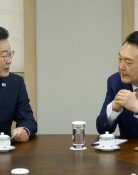Retirement age extension, youth employment in no conflict with each other`
Retirement age extension, youth employment in no conflict with each other`
Posted June. 01, 2013 06:42,
At the third population and aging forum on Friday, hosted by the Korea Labor Force Development Institute for the Age, Park Gi-chul, head of the retirement institute at the Samsung Life Insurance, introduced results of a simulation study conducted by the British government, which suggests that one-year extension of retirement age brings about 1 percent growth in real GDP six years later.
Britains policy experience sends significant implications to Korea, where the National Assembly just passed a revision bill to ban age discrimination in employment and to promote the employment of people at advanced age, which calls for the extension of retirement age to 60 by business in phases beginning in 2016.
We can hardly find any reason to object the attempt to extend retirement age aimed at enabling people at advanced ages with sound mind and body to work for a longer career in Korean society where life expectancy has reached 81 as of 2011. But there is concern that the extension of working period for people in the prime of life could result in reduction of new hires among young generation, and thus aggravate generational conflicts. The result of simulation in Britain, however, has demonstrated that people in the prime of life and young generation are not in a zero-sum relationship , which they fight each other over the same jobs, but can form complementary relations that have mutually positive effect each other.
Amid prevailing sentiment in Britain in the 1970s that high youth unemployment is due to active workers at advanced age, the nation also introduced a Job Release Scheme, which forced women aged 59 and men aged 65 to retire prematurely. But the youth unemployment did not decline during the period when the policy was in effect (1977-1988). According to the Institute for Fiscal Studies in Britain, participation in the job market of people at advanced ages was directly proportional with employment of youth between 1968 and 2005. This illustrates that high youth unemployment was not due to employment of people at advanced age, but due to economic recession.
Extension of retirement age and youth employment do not conflict with each other because the type of jobs selected by people at advanced age and youth, related skills required, the level of experience and preference are different. In Korea, jobs that are primarily taken by people in the prime of life are farming, logistics and management, simple manual labor, and service jobs, while the youth generation prefers educational experts, administrative posts in business management and accounting, and jobs at national institutions and conglomerates, and hence the two groups cannot be considered to be in rivalry relations.
Of course, if the retirement age is extended, individual companies will have no choice but to reduce new hires. But when seen from the perspective of the overall national economy, as more people at advanced age are engaged in vocational activities, fiscal burden weighing on the state declines, and economic growth accelerates. For this reason, the Organization for Economic Cooperation and Development recommended in 2005 countries to scrap the early retirement system that was implemented by certain countries. Employment policy should be implemented based on a two track approach, in which opportunities for business start-up are provided to youth, while service sector jobs are offered to people in the prime of life, who have accumulated experience and skills.







